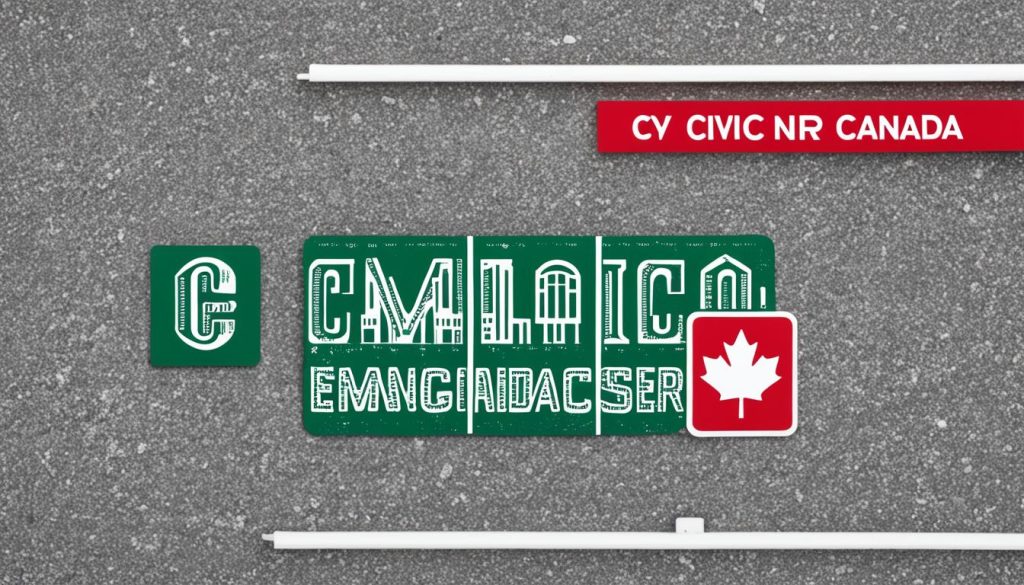Have you ever noticed the unique numbers displayed on houses and buildings across Canada? These numbers, known as civic numbers, play a crucial role in identifying and locating properties. In this blog post, we will explore what exactly a civic number is, why it’s important, and how it impacts our daily lives. Join us on this journey to uncover the significance of these seemingly ordinary digits!
Understanding Civic Numbers in Canada
Civic numbers are an integral part of the municipal address system in Canada, serving as unique identifiers for specific properties or buildings. These civic numbers play a crucial role in enabling emergency responders, utility providers, and other service agencies to quickly locate and respond to a particular address. Assigned by the local municipal government, civic numbers are used to pinpoint the physical location of residences and businesses across the country.
Significance of Civic Numbers
The civic number significance lies in its ability to provide a distinct and unambiguous way of identifying a specific property or building. This unique identifier is essential for ensuring accurate and efficient delivery of various services, from emergency response to utility maintenance. By using civic numbers, service providers can quickly and reliably determine the exact location of a residence or business, allowing them to respond promptly to any needs or issues that may arise.
Differences Between Civic and Mailing Addresses
While civic address vs mailing address, municipal address vs mailing address, and street address vs mailing address may seem similar, they serve distinct purposes. The civic number is part of the overall civic address, which includes the street number, street name, and municipality. In contrast, the mailing address is the address used by Canada Post to deliver mail and is typically different from the civic address, often including the postal code.
Understanding the differences between these address types is crucial for ensuring accurate communication and effective service delivery, whether it’s for emergency response, utility services, or other important interactions with authorities and service providers.

What Is a Civic Number?
A civic number is a unique identifier assigned to a property or building by the local municipal government. It is part of the overall civic address, which includes the street number, street name, and municipality. Civic numbers are used to identify the physical location of a residence or business and are an important part of an address.
The civic number serves as a crucial component of the municipal address system in Canada. It allows emergency responders, utility providers, and other service agencies to quickly locate a specific property or building. Civic numbers are assigned by the local municipal government and are an essential part of the overall address structure.

Understanding the role and significance of civic numbers is crucial for individuals and businesses in Canada. They play a vital role in ensuring efficient service delivery, emergency response, and accurate identification of property locations. Whether you’re a homeowner or a business owner, being aware of your civic number and its purpose can help you navigate the administrative and practical aspects of your address.
Importance of Displaying Civic Numbers
Displaying your civic number prominently on your property is crucial for several reasons. Firstly, it helps emergency responders, such as police, fire, and ambulance services, to quickly locate your property in the event of an emergency. Your civic number is the primary identifier used by 911 operators and emergency services to pinpoint your location and dispatch the appropriate resources. This civic number for emergency response can mean the difference between life and death in critical situations.
Emergency Response
When an emergency occurs, every second counts. Clearly visible civic numbers allow first responders to rapidly find the exact address they need to attend to, saving precious time. This importance of displaying civic number ensures that emergency services can reach you or your loved ones as quickly as possible, increasing the chances of positive outcomes.
Utility Services
In addition to emergency response, civic numbers are equally important for utility services such as water, electricity, and gas. Utility providers rely on civic numbers to identify the specific property they need to access for maintenance, repairs, or new installations. Displaying your civic number for utility services ensures that these essential service providers can efficiently locate and attend to your needs, minimizing disruptions to your daily life.
Overall, the why is civic number important is undeniable. By prominently displaying your civic number, you not only help emergency responders and utility providers do their jobs effectively, but you also contribute to the overall safety and well-being of your community.

Formatting and Patterns of Civic Numbers
Civic numbers in Canada follow a specific format and pattern, but these can vary depending on the province. Generally, the civic number consists of the street number, street name, and municipality, in the following format:
| Province | Civic Number Format | Examples |
|---|---|---|
| Ontario | [STREET NUMBER] [STREET NAME], [MUNICIPALITY], ON | 123 Main Street, Toronto, ON |
| Quebec | [STREET NUMBER], [STREET NAME], [MUNICIPALITY], QC | 456, Rue de la Commune, Montréal, QC |
| British Columbia | [STREET NUMBER] – [STREET NAME], [MUNICIPALITY], BC | 789 – Granville Street, Vancouver, BC |
| Alberta | [STREET NUMBER] [STREET NAME], [MUNICIPALITY], AB | 321 Jasper Avenue, Edmonton, AB |
These civic number patterns are designed to provide a consistent and logical way to identify the physical location of a property or building within a particular municipality. The specific civic number variations by province ensure that the addressing system is tailored to the unique characteristics and requirements of each region.

Finding Your Civic Number
If you’re unsure of your civic number, there are a few ways you can find it. The first and most direct method is to contact your local municipal government office, such as the planning or building department. These offices are responsible for assigning and managing civic numbers within the municipality and will have the most up-to-date information on your property’s civic number.
Contacting Local Government
Reaching out to your local government is often the easiest way to determine your civic number. Municipal offices that handle property and land-related matters, such as the planning or building departments, will be able to provide you with your specific civic number. All you need to do is call or visit your local municipal office and provide them with your property address or other identifying details, and they can look up and confirm your civic number.
Online Resources
In addition to contacting your local government, there are also online resources available that can help you find your civic number. Many municipal and provincial government websites offer property search tools or address lookup features where you can enter your address and retrieve the associated civic number. Some private property data providers may also have this information accessible online. While these online methods can be convenient, it’s always best to verify the accuracy of the civic number with your local municipal office.
Civic Number vs. Street Number
While civic numbers and street numbers are related, they are not the same thing. A civic number is a unique identifier assigned to a property by the local municipal government, and it is part of the overall civic address, which includes the street number, street name, and municipality. On the other hand, a street number refers specifically to the numerical designation of a property along a particular street, without the additional context of the municipality or the full civic address.
Differences and Similarities
The primary difference between a civic number and a street number is the scope and purpose of each identifier. The civic number is used by various service providers, emergency responders, and government agencies to locate a specific property, while the street number is more focused on the physical location of the property within a given street. However, both the civic number and the street number work together to form the complete address, with the civic number being the more comprehensive and official identifier.
Despite these differences, civic numbers and street numbers share some similarities. Both are numerical designations that help distinguish one property from another and provide a clear way to identify a specific location. Additionally, the street number is typically a component of the civic number, with the two working in tandem to create a unified address system.
| Civic Number | Street Number |
|---|---|
| Unique identifier assigned by the municipal government | Numerical designation of a property along a specific street |
| Part of the complete civic address (including street name and municipality) | Focuses on the physical location within a street |
| Used by various service providers, emergency responders, and government agencies | More localized in scope, but still an essential component of the address |
| Provides a comprehensive way to locate a specific property | Works in conjunction with the civic number to form the complete address |
Conclusion
In summary, a civic number is a crucial identifier assigned to properties and buildings by local municipal governments across Canada. This unique number, which is part of the overall civic address, serves as a vital reference point for emergency responders, utility providers, and other service agencies. Understanding the significance and formatting of civic numbers is essential for navigating the Canadian address system effectively.
The importance of civic numbers in Canada cannot be overstated, as they ensure efficient emergency response, facilitate utility services, and help to streamline various administrative processes. By prominently displaying their civic number, individuals and businesses can contribute to the smooth operation of their communities and enhance public safety.
The key takeaways from this article are that civic numbers vary in format and pattern depending on the province, but they consistently include the street number, street name, and municipality. Individuals can contact their local government or utilize online resources to determine their civic number if they are unsure. Recognizing the distinction between civic numbers and street numbers is also important for a comprehensive understanding of the Canadian address system.
FAQ
1. What is a civic number?
A civic number, also known as a municipal address or street address, is a unique identifier assigned to a property or building in Canada. Civic numbers are used to identify the physical location of a residence or business and are an important part of an address.
2. Why are civic numbers important?
Civic numbers are important for several reasons, including helping emergency responders quickly locate a property, enabling utility providers to deliver services, and allowing other service agencies to identify the specific location of a residence or business.
3. How is a civic number different from a mailing address?
A civic number is part of the overall civic address and identifies the physical location of a property, while a mailing address, including the postal code, is assigned by Canada Post and is used for mail delivery.
4. What is the format of a civic number in Canada?
Civic numbers in Canada generally follow a pattern of [STREET NUMBER] [STREET NAME], [MUNICIPALITY], [PROVINCE CODE], but the specific format can vary depending on the province.
5. How can I find my civic number?
The best way to find your civic number is to contact your local municipal government office, such as the planning or building department, as they are responsible for assigning and managing civic numbers within the municipality.
6. What is the difference between a civic number and a street number?
While related, a civic number is a unique identifier assigned to a property by the local municipal government, whereas a street number is the numeric part of the address that identifies a specific building or location on a street.




